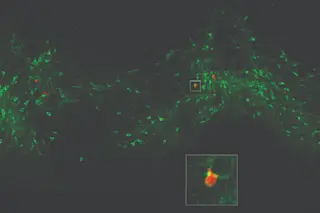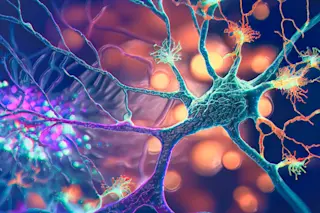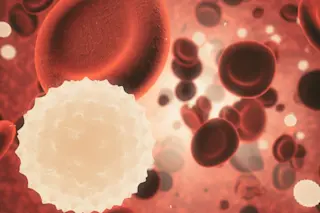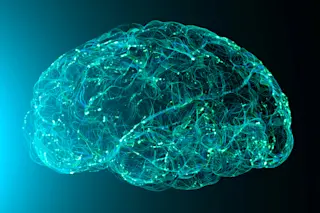What's the News: Researchers have grown neurons from the cells of people with schizophrenia, in a study published online yesterday in Nature, the first time a complex mental illness has been modeled with living cells in a lab. This approach provides a new way to probe the little-understood biological processes underlying the disease and to test potential drug treatments. In preliminary experiments, the researchers found that the neurons weren't as interconnected as healthy neurons are, and that individual patients' neurons differ in their reaction to various drugs used to treat schizophrenia. How the Heck:
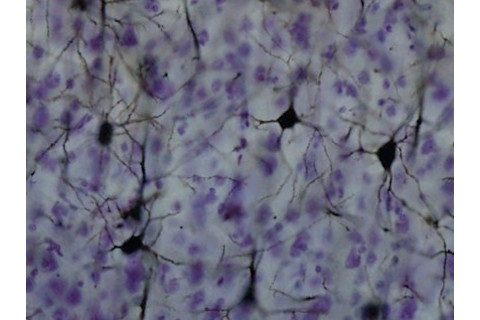
What's the Context:
The researchers took small samples of skin cells from four patients with schizophrenia, and programmed the cells to become induced pluripotent stem cells, a process that turns tissue-specific adult cells into undifferentiated stem cells. By treating those stem cells a certain way and putting them in a particular medium, the researchers nudged the stem cells to turn into neurons.
By infecting the cells with a modified rabies virus and tracking how it spread from neuron to neuron the researchers found that these neurons formed fewer connections than lab-grown healthy neurons do.
Once the neurons were grown, the researchers tested how they responded to five different antipsychotic drugs. One drug---loxapine, often prescribed for schizophrenia---boosted the number of neuronal connections in all four patients' cells. None of the other four drugs showed a consistent effect, but each drug seemed to increase connectivity in the neurons from at least one patient.
Previous studies have used induced pluripotent stem cells to model other diseases that impact the brain, like Down Syndrome and familial dysautonomia, but these diseases have all had a clear genetic basis---unlike schizophrenia, which is a complex disorder caused by both genes and environment. "Nobody knows how much the environment contributes to the disease," Salk Institute stem cell researcher Kristen Brennand, the study's lead author, told Livescience.com. "By growing neurons in a dish, we can take the environment out of the equation and start focusing on the underlying biological problems."
Since most of what scientists know about the neural underpinnings of schizophrenia comes from examining patients' brain tissue after they've died, this technique provides a rare opportunity to observe the neurons of schizophrenic patients in action.
Not So Fast:
The process of making induced pluripotent stem cells can introduce errors into the cell, which means that neurons made from these cells in a lab don't necessarily grow and respond the way neurons in a patient's brain do.
Likewise, the fact that neurons in the lab formed fewer connections doesn't necessarily mean that scaled-back neuronal connectivity underlies schizophrenia, psychiatric geneticist Michael Owen of Cardiff University told Nature News.
The Future Holds:
Having a neurons taken from a patient's own cells could be a step forward for personalized medicine, helping doctors find what medications might work best for a particular person based on how their neurons respond. "The patient can be his or her own guinea pig for the design of his or her own treatment, without having to be experimented on directly," Penn State biologist Gong Chen told LiveScience.com.
Reference: Kristin J. Brennand et al. "Modelling schizophrenia using human induced pluripotent stem cells," Nature, April 14, 2011. doi:10.1038/nature09915
Image: Wikimedia Commons / Kauczuk








